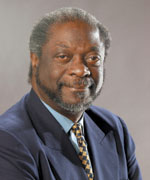Investigative Classics is a weekly feature on noteworthy past examples of the reporting craft.
Journalism lost a renowned figure when Les Payne died last week at age 76. The Pulitzer-winning reporter, columnist and editor at Newsday was a co-founder and past president (1981-1983) of the National Association of Black Journalists.
Even as he worked to create opportunities for others, Payne honed his craft. After graduating from the University of Connecticut in 1964, he served in the Army for five years; his duties included acting as a spokesman for General William Westmoreland in Vietnam.

Payne arrived at Newsday in 1969. A few years later he was assigned to a team, led by senior editor Robert W. Greene and fellow reporter Knut Royce. “The reporting assignment was simple enough,” Payne later recalled involving one of the more harrowing goals of the series. “Go to Corsica and nail Marcel Francisci — the heroin kingpin of Europe.”
They didn’t nail Francisci, but Payne and his colleagues did produce a 33-part series, “The Heroin Trail,” that traced the path of the narcotic from the poppy fields of Turkey, along the smuggling roots of Europe to the French labs that processed the heroin to the streets of Long Island where the drug exacted a deadly toll.
The series was awarded the Pulitzer Prize for Public Service in 1974.
Newsday has posted a sample of Payne’s work, including the first installment of the heroin series, whose opening sounds almost biblical:
This is where it all begins.
Ayfon. The province and its principal city are both named for the opium poppy plant. Man joins nature in consecrating opium here. A thousand-foot rock-mountain juts up in the center of Ayfon town like a minaret of some sprawling mosque.
Atop the rock is an ancient castle in ruins. The poppy farmers call it “Ayfon Kara Hisar” – The Black Castle of Opium Mountain.
Ayfon has been a citadel for opium for almost a thousand years. It is stark country, high, baked dry in the summer, ravished in winter by snow and ice-winds blowing off the Turkish steppe. The growing season here is short. The soil is dust-blown, poor. This land will nourish only the hardiest of crops for the most patient and long-suffering of farmers. Opium is that rare hardy crop. The Ayfon peasant is that patient and long-suffering farmer. There are 90,000 farmers in Ayfon and other provinces in Anatolia, the Asian part of Turkey, who rely on the poppy for survival.
The poppy is the staple of village life. Over the centuries, many uses have been developed for the plant. Its oil is a base for cooking; its leaves go into traditional salad; its seeds enrich the bread; its pods are fed to livestock; and its stalks are woven into cottage ceilings.
Only the gum is not used by villagers. They sell it two ways: to the Turkish government, which last year paid $7.47 for each pound of gum for medicinal uses, or illegally to drug smugglers who paid 20 percent more. About two-thirds of the crop is sold illegally. The farmers’ illegal profits are small, but they are vital in a land where opium is the only dependable cash crop and where the average family has a cash income of less than $300 a year.
This opening article also provides vivid detail of the cultivation of the crop and insight into local life. After noting that women performed much of the field work in the nearby village of Degirmendere, the Newsday team reported:
As the men spoke about women, their sense of tradition and independence from – and disobedience of – government laws that they disagreed with became clear.
For example, the wearing of the veil by women in Turkey has been forbidden by government regulation for over 35 years. Yet every female in Degirmendere over 15 years of age wears a veil. The veil, as well as the sack-like pantaloons and the long-sleeve blouses the women wore, the men explained to us, muffled men’s passions. “Ninety percent of the crimes are because of women – crimes of passion,” [village headman Faruk] Erhan said.
They didn’t view the women as being oppressed. “Some say that women are working and the men are playing cards. But in this part of the country everyone works. We like work more than ourselves. Here the women go to the fields with pleasure.”



